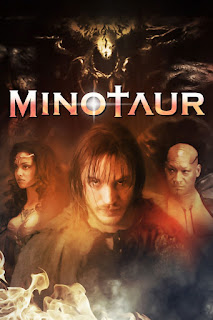Minotaur is a 2006 direct-to-video film starring Tom Hardy as “Theo,” the shepherd-hero who wants to rescue a bunch of children from being eaten by a bull-god in a subterranean labyrinth. It is awful.
I like the Theseus/Minotaur legend as much as the next person who briefly considered becoming a classicist. Ariadne was always my favorite character (terminally single smart girl who likes textile crafts? I feel seen!), and labyrinths in general are fascinating.
This movie is... not fascinating. The plot is basic in the same way that all monster movies follow the How to Kill a Dragon formula. Every three years, the all-powerful Minoans demand a tribute of eight “children” (all of whom are in their mid-twenties, so this is childhood as defined by 90s teen-drama casting). Three years ago, love interest Ffion was taken. This time, Theo volunteers as tribute after learning from the village witch that Ffion may still alive. He, along with seven of his buddies, winds up in the labyrinth. There’s a love quadrangle, a betrayal, a few deaths, etc.
The movie is bad in all the ways you’d expect from the SyFy channel back when it was the Sci-Fi channel; this is a 90s cable movie made in 2006. The sets are dull. The costumes are from Bed, Bath, and Beyond. The acting is bad. The cinematography is lots of zooms. I was most disappointed by the labyrinth (which was really just a cave system) and the minotaur itself (which was really just a big, weird bull whose every appearance generated the closed captioning to identify “[deep growling]”).
The racial politics of the film are at roughly the level of Zack Snyder’s 300, which is to say that on a scale of 1 to 10, the film is racist. Specifically, racism as filtered through Orientalism by way of Nietzsche’s Apollonian/Dionysian binary, with the Minoans as a vast southern empire that demands tribute from northern villages like Theo’s.
The northerners mostly have names like Danu, Ffion, and Cyrnan. They are all white. They wear loose-fitting knitted blankets over their breeches. Their hair is unkempt and nobody wears makeup. Their village could double as an early-medieval Normandy village, even though this is set in the “age of gods and spirits.” They are shepherds.
The southerners have names like Raphaella and Deucalion. They are all Black or brown. They wear tailored, woven sheets wrapped as togas or drapey sundresses; sometimes the men just wear skirts. Leather skirts. Their décor is Egyptian as interpreted by Stargate. They have tattoos, sport an on-fleek smoky eye with a bold lip, and inhale a “gas” that I’m pretty sure is either pot or carbon monoxide. They are incestuous tyrants.
The northerners have a few different debates about the nature of the minotaur: beast or god? Are gods from the sky or the earth? Can a god be killed, and if so, is it still a god? I wanted to love these conversations, since it’s important to remember that the past was not monolithic: people had different opinions on things back then, too.
But these debates never go anywhere, and the result is a portrayal of the northerners as proto-Enlightenment agnostics, loftily puzzling over the problem of divinity from a comfy intellectual position, as opposed to the southerners, who live with a bull-god beneath their feet, use seduction as strategy, and are suspiciously clean. The mind vs. the body, the intellect vs. the desire. Airy ghosts vs. fiery weapons.
I am definitely overthinking it.
 |
| This was my hair during lockdown. |
There is something very odd about watching 2006 Tom Hardy, which is to say Tom Hardy before he became Tom Hardy. It’s like looking at an egg next to a souffle: how do we get from this smooth-cheeked wonder to that tantalizing, precarious snack? Back in 2006, Tom Hardy was still “acting” rather than existing as a charismatic refraction of his own identity, and the result is on par with the quality of the rest of the film.
Having said that—having criticized every single part of this film—I’m glad I watched it. It was so thoughtless that it allowed me to fill it with my own thinking; it was so cheap that I enjoyed the unintentional comedy of its silliness. I’ve watched a lot of bad movies in my life, but I haven’t watched too many that are bad in this direct-to-video style, and there’s something to be said for the satisfaction of low expectations.
Four out of four minotaurs.
Josie Kafka is a full-time cat servant and part-time rogue demon hunter. (What's a rogue demon?)


Thanks for the amusing review of a terrible film--funny how sometimes bad reviews are more fun to read (and to write?) than good ones. Maybe they're like families: as Chekhov said (paraphrasing), all happy families are the same whereas each unhappy family is unhappy in its own unique way.
ReplyDeleteThere was another dreadful movie called "Hellhounds" made in 2009 that was a reworking of the Orpheus legend. I checked but none of the writing or directorial "talent" were the same. I guess there was a vogue for terrible adaptations of Greek myths around that time.
Josie, thank you so much for this review. I can't even pick my favorite description -- okay, maybe it's the description of early Tom Hardy like looking at an egg next to a souffle. I was once deeply into Greek mythology (when I was a teenager) but sadly, that never carried over to watching terrible movies with gods and heroes wearing costumes from Bed, Bath and Beyond.
ReplyDelete